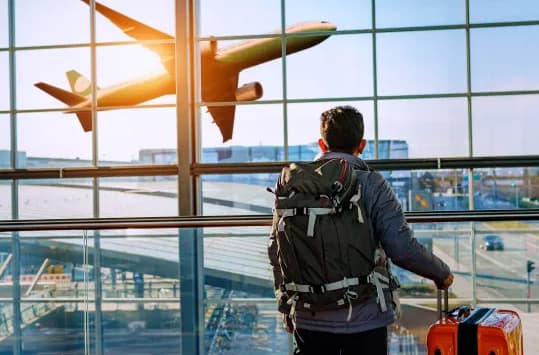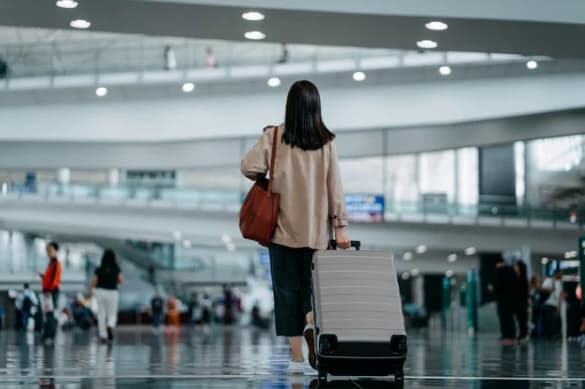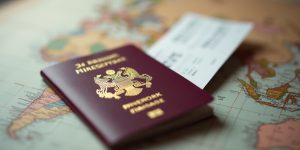Planning a long-haul or expensive flight? Traveling during peak holiday seasons, monsoons, or other high-risk periods? Flight insurance can be a smart safety net, protecting you against unexpected cancellations, delays, and disruptions. For short domestic or budget flights, it may not always be necessary.
Many travelers either buy insurance without fully understanding what it covers or skip it altogether, only to face costly surprises later.
In this guide, we’ll break down what flight insurance covers in 2025, typical costs, and help you decide when it’s worth buying. You’ll also learn how to avoid unnecessary policies while staying protected, ensuring a smooth and worry-free travel experience.
Is Flight Insurance Worth It? Quick Answer
Flight insurance pays off when you book expensive trips that you can’t get refunded.
- Flight insurance is worth it for expensive, non-refundable trips with high cancellation risks.
- It is often unnecessary if your flight is refundable or covered by your credit card.
- It covers cancellations, delays, lost baggage, and emergencies, but limits apply.
How to Get Flight Insurance
Getting flight insurance is simple, with several options:
- Airline: Buy coverage when booking your tickets.
- Travel Provider: Add insurance after booking through agencies or platforms.
- Credit Card: Some cards offer insurance if you use them to pay for your trip.
- Insurance Company: Purchase a comprehensive travel policy directly.
- Air Travel Policies: Specialized coverage for flight delays and baggage may not include airfare.
What Does Flight Insurance Cover?
Flight insurance protects your money when travel problems happen that aren’t your fault. Most policies focus on the significant expenses that can really hurt your budget.

- Trip Cancellations and Interruptions:
It covers your prepaid trip costs if you cancel or cut your trip short for covered reasons like illness, injury, family death, or job loss.
- Flight Delays and Missed Connections:
Pays for meals, hotels, and new flights if your trip is delayed for several hours (usually 3 to 12 hours). It also covers missed connections caused by delays.
- Lost, Delayed, or Damaged Baggage:
It covers the cost of essential items if your luggage is lost, delayed, stolen, or damaged during your trip.
- Emergency Medical Coverage:
Helps cover the cost of medical treatment if you become sick or injured during your trip. Coverage amounts are usually limited.
- Accidental Death or Dismemberment:
Provides a small payout if you suffer a serious accident leading to death or permanent injury during your trip.
Do you know that the Cheapest Days of the Week to Fly Internationally can save you hundreds if timed right with airline fare cycles and booking patterns?
What Does Flight Insurance Not Cover?
Flight insurance has many rules about what it won’t pay for. These limits often surprise people when they try to make claims.
- Pre-Existing Medical Conditions
Most policies won’t cover cancellations for health issues you had before buying insurance unless you purchase coverage soon after booking your trip.
- Changing Your Mind
Insurance won’t pay if you simply want to cancel, change travel dates, switch destinations, or upgrade your plans.
- Risky Activities or Dangerous Destinations
Coverage usually excludes extreme sports, adventure activities, or travel to countries under government travel warnings.
- Short Delays
Delays shorter than 3 to 6 hours generally don’t qualify for compensation, meaning you cover minor inconveniences yourself.
- Known Risks Before Buying
You won’t be covered for problems you knew about before purchasing insurance, like forecasted storms, strikes, or other expected disruptions.
How Much Does Flight Insurance Cost?
Flight insurance usually costs about 4% to 10% of your total trip cost. This means most people pay between $30 and $200 per person for coverage, depending on the trip’s price.

The cost also depends on factors like your age, trip length, and destination. Longer trips or international travel may raise the price.
If you choose extra coverage, like medical protection, or cancel insurance, the cost will be higher. More protection always increases the price of flight insurance.
Factors Determining The Cost Of Flight Insurance
The cost of flight insurance depends on several important details about your trip and personal situation:
- Trip Cost and Length:
Higher-priced trips and longer vacations are more expensive to insure because they carry a greater financial risk.
- Your Age and Health:
Older travelers and those with medical issues usually pay more since they have a higher chance of canceling for health reasons.
- Where You’re Going:
Insurance costs more for international travel, especially to high-risk countries or places prone to natural disasters.
- How Much Coverage You Want
Policies with higher limits or extra benefits cost more but offer better protection and lower out-of-pocket expenses.
How Much Can You Get Reimbursed With Flight Insurance?
The amount you can get reimbursed for with flight insurance depends on the type of coverage you choose.
Most plans cover between $1,000 and $100,000 per person for major issues like trip cancellations, medical emergencies, or accidental death.
Let’s take an example:
Sarah booked a $3,800 non-refundable trip to Hawaii. A week before the trip, she got sick and couldn’t travel.
Since she had a good flight insurance plan and provided a doctor’s note, her insurance company reimbursed her for the full cost, including flights, hotel, and pre-paid tours.
This shows how flight insurance can protect your money when unexpected situations come up, especially for expensive trips you can’t cancel for free.
Top Reasons to Buy Flight Insurance
Flight insurance makes the most sense in situations where you could lose a lot of money or face high travel risks.

- Expensive, Non-Refundable Flights: If your plane tickets cost $1,000 or more per person, flight insurance protects your money in case you need to cancel.
- International Trips with Many Parts: Complex trips involving multiple flights, tours, and hotels increase the chances of problems. Insurance helps cover unexpected changes or cancellations.
- Traveling During Risky Seasons: Trips during winter storms, hurricane season, or periods when illnesses are more prevalent have a higher risk of cancellations and delays.
- Travelers with Health Concerns or Tight Schedules: People with pre-existing medical conditions, older travelers, or those with strict work or personal schedules may benefit from coverage if they need to cancel their trip unexpectedly.
When to Skip Flight Insurance
Many travel situations don’t need the extra cost of flight insurance, especially when you already have protection or don’t risk much money.
- Refundable or flexible tickets: When your airline lets you cancel or change flights for free, buying more insurance just duplicates what you already have.
- Short, cheap domestic flights: Weekend trips or flights under $300 per person rarely need insurance, especially if you can afford to lose that money.
- Good credit card coverage: Many premium credit cards already provide trip cancellation, delay coverage, and bag protection that work, as well as separate insurance.
- Low money risk or flexible plans: Travelers who can easily absorb cancellation costs or adjust their plans without major issues might prefer to skip insurance.
Flight Insurance vs. Travel Insurance: Which Is Better?
Knowing the difference between flight insurance and travel insurance helps you pick the right protection level for your needs and budget.
| What It Covers | Flight Insurance | Travel Insurance |
|---|---|---|
| What’s Protected | Just flights and related costs | Your whole trip, including hotels, activities |
| Medical Help | Very little or none | Lots of emergency medical and evacuation help |
| Price | Cheaper, usually $30-$100 | More expensive, $100-$500+ depending on trip |
| Best For | Simple flight-only bookings | Complex trips with many parts |
Flight insurance works well when you book flights separately from hotels and just want basic protection.
Travel insurance is more suitable for complex trips that include tours, cruises, or numerous prepaid expenses beyond flights.
Consider your total trip investment and how complicated the decision-making process can be.
How to Decide If Flight Insurance Is Right for You
Making the right insurance choice means looking at your specific situation against clear guidelines that help determine if the protection is worth the cost.
- Think About Your Trip’s Cost and Non-Refundable Expenses: Add up all the money you could lose, including flights, hotels, and activities. Insurance makes more sense if you risk losing over $1,000 per person.
- Check Your Existing Coverage: Review the benefits from your credit cards, work policies, and health insurance to avoid paying twice for the same protection.
- Consider Your Destination and Travel Risks: Consider weather, political issues, and healthcare quality at your destination to assess the likelihood of potential problems.
- Decide Based on Your Comfort With Risk: Some travelers prefer the peace of mind insurance offers, while others who accept risk may choose to save money instead.
Is Flight Insurance Worth It in 2025?
Flight insurance can provide valuable protection, especially in 2025 with rising travel costs. Key points to consider:
- Coverage: Protects against trip cancellations, travel delays, lost baggage, and medical emergencies.
- Cost: Usually 4–10% of your prepaid trip expenses.
- When It’s Useful: Ideal for expensive trips, international travel, or high-risk seasons like storm periods.
- When It May Not Be Needed: Short or low-cost flights where losses are easily manageable.
- Exclusions: Pre-existing medical conditions and high-risk activities may not be covered.
- Tip: Always read the policy carefully to ensure it meets your travel needs.
International vs Domestic Flight Insurance: Key Differences
Flight insurance works for both international and domestic trips, but the coverage and risks aren’t the same.
International trips usually need broader protection, higher cancellation coverage, missed-connection benefits, and better baggage insurance. Premiums are also higher because long-distance routes have more chances of delays and expensive rebooking.
Domestic trips involve simpler, low-cost coverage focused on delays, cancellations, and basic baggage issues. Claims are easier, require fewer documents, and compensation amounts are smaller. In short, choose international flight insurance for expensive or long-haul journeys, and domestic insurance when you need affordable protection for short, in-country travel.
Related Read:
Conclusion: Before you buy, see if flight insurance is really worth it
Flight insurance can give peace of mind and protect your travel investment, but it’s not essential for every trip. Its value depends on your trip type, existing coverage, and tolerance for financial risk.
For expensive international flights, non-refundable bookings, or travel during high-risk periods, insurance is usually a smart choice. For short domestic trips with flexible tickets, it may not be necessary.
Before buying, weigh potential losses, check your current coverage, and assess risks at your destination. The best approach balances cost, protection, and peace of mind, helping you travel confidently without overpaying.
FAQs
Flight insurance can usually be purchased within 14-30 days after booking, but some benefits require buying it within 10-20 days for full coverage.
Pregnancy complications after buying the policy may be covered, but routine care and normal delivery usually aren’t.
Most flight insurance is non-refundable after purchase, though some companies offer a 10-15 day period to cancel and receive a refund.



